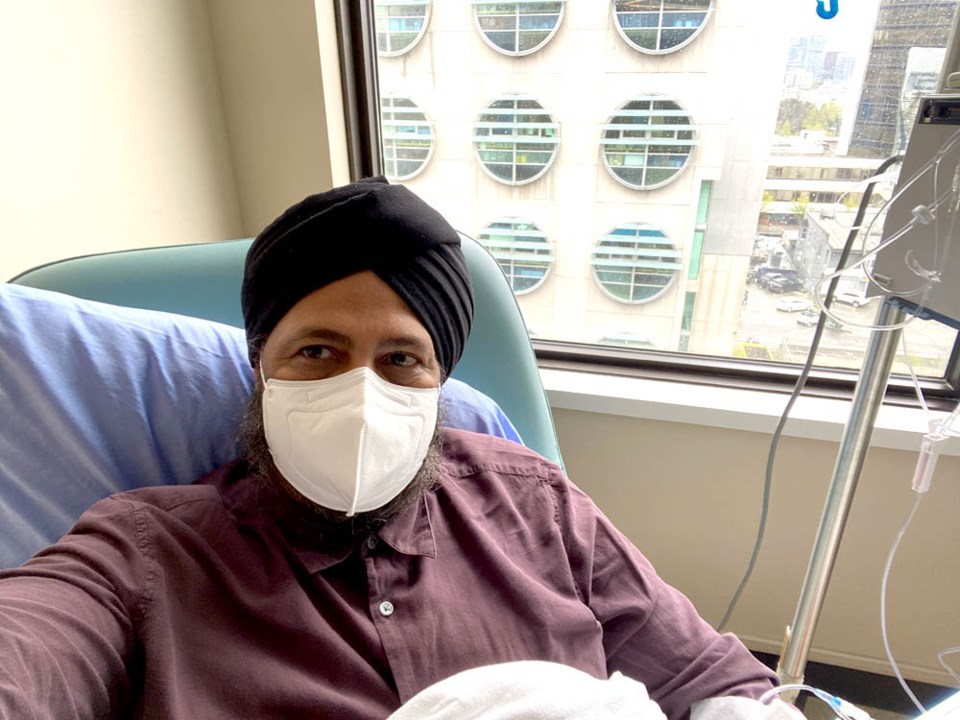Richmond-Queensborough MLA Aman Singh has been watching TikTok videos about pooping into a bag.
In fact, he’s found a whole online community discussing stoma bags that has reduced his stigma and normalized what he will have to go through after he has surgery in June as part of his “cancer journey.”
Singh found out last August through a routine colon screening test that, in fact, he had cancer, despite not having any gastrointestinal – or any other - symptoms.
Not only did it take him on a medical journey, it has put his life in perspective as well.
Singh’s initial reaction was anxiety and fear, and he thought about how this would affect his family, especially his daughter who was still a toddler.
“You really do face your own mortality at that point - am I going to live?” Singh told the Richmond News, adding “That was my first thought: I can’t die - I need to be here for her.”
Singh is not the first person in his family to have cancer and he knows how it can affect everyone around the person who has been diagnosed.
Both Singh’s mother and father had cancer. His father survived prostate cancer, but his mother eventually died from breast cancer after a 10-year remission period.
“My mom passed away about four years ago from cancer, so we’d seen the journey with her,” Singh said.
Singh knows that after his treatment, he will be on guard for the rest of his life of it coming back.
But it has given him a new perspective on his life and taught him what is important.
“Life is really precious – all those small things that you think might matter, really don’t matter,” Singh said. “What matters is family and your loved ones and what you do – it really reinvigorated my zeal to do whatever I can to leave this world a better place, primarily for my child and my family and others around me.”
Regular screening resulted in diagnosis
Because he’s over 50, Singh was going for annual cancer screening tests. And the one last year came back with blood in his stool.
In August, he had a colonoscopy where the doctors found a two-centimetre-long, stage-three cancerous tumour as well as a couple swollen lymph nodes close to the mass.
His team of oncologists met and then presented him with treatment options, either to have a biopsy on the lymph nodes and then radiation and chemo, or to have radiation and chemo first, followed by surgery.
Singh chose the latter.
Singh did five sessions of radiation in October, followed by chemotherapy.
He had his last chemo treatment just a few weeks ago, and in the coming weeks he’ll have a CT scan and a colonoscopy, following a recent MRI.
These tests will determine what kind of surgery he will need in early June – whether it will be abdominal surgery or less-invasive laparoscopic surgery which involves a small incision whereby the surgeon uses a light and a camera to do the surgery.
With himself and his family members having experienced the health-care system through cancer treatment, Singh said he’s grateful for free care in Canada, especially compared to the United States where he also has family.
“Every health system has its drawbacks and we can criticize it all we want, but from my experience and my family’s experience… it’s been phenomenal. I have nothing but faith and good things to say about our health system and health workers,” Singh said.
And he’s encouraging everyone to get screened regularly for cancer, and take advantage of public health care that can catch illnesses early allowing for better outcomes.
“I wouldn’t have known if it hadn’t been for that regular blood test,” he said. “If I had left it, it would have been stage four.”
Screening is available for different types of cancer - breast, cervical and colon cancer.
Men over the age of 50 are encouraged to be screened for prostate cancer as well.
Singh’s screening included blood tests for white blood cell counts and a fecal test to detect blood in the stool.
“I’m so glad that I did it and I really encourage everybody else to go out and get tested,” Singh said.
TikTok, Instagram help reduce stigma of 'pooping into a bag'
After surgery, Singh said he’ll be “pooping into a bag” for a few months as not to contaminate the surgical area.
This, too, carries a lot of stigma.
But Singh has tapped into a whole online community, including young people - people who’ve had cancer or have Crohn’s disease or other gastrointestinal conditions – discussing stoma bags, and there are even TikToks and information on Instagram that have helped lower the stigma around it.
“There’s really so much stigma around our bodily functions, around breasts, around colon,” Singh said. “It’s understandable but there’s no need to be, this is part of our body and we really need to normalize it.”
Singh compared the stigma around cancer to his fight with alcoholism. When he ended up in the hospital due to internal bleeding caused by excessive alcohol consumption, he didn’t know there was help for his condition.
“I had no idea there were other alcoholics out there, and I had so little knowledge of how you could recover from this,” Singh said.
And going to Alcoholics Anonymous meetings, he met other people for the first time who had also struggled to stay sober.
“Seeing other people recover, whether it’s from alcoholism or cancer or other things… and seeing other people live full lives, that really gave me a lot of hope and the message is hope is out there – look for that hope,” Singh said.



